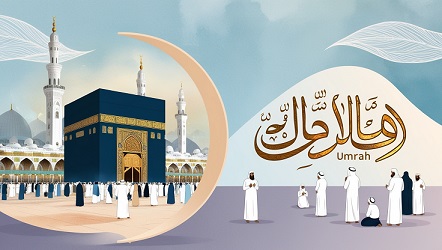Have you ever wondered about the key differences between Hajj and Umrah? 🕋 These two sacred pilgrimages in Islam often confuse both Muslims and non-Muslims alike. While both involve journeying to the holy city of Mecca, they are distinct in several crucial ways. Understanding these differences is not only important for those planning to embark on these spiritual journeys but also for anyone seeking to deepen their knowledge of Islamic practices.
Imagine standing in the heart of Mecca, surrounded by millions of fellow worshippers, all united in faith and purpose. Now, picture a similar scene, but with a different atmosphere and set of rituals. This is the essence of the distinction between Hajj and Umrah. Whether you’re a devout Muslim preparing for your pilgrimage or simply curious about Islamic traditions, knowing the main differences between these two sacred journeys is essential.
In this blog post, we’ll explore the fundamental aspects that set Hajj and Umrah apart, including their timing, obligations, rituals, and preparations. We’ll also delve into the unique rewards and benefits associated with each pilgrimage. Let’s embark on this enlightening journey to uncover the key distinctions between Hajj and Umrah that everyone should know. 🌟

Understanding Hajj and Umrah
Definition of Hajj
Hajj is the annual pilgrimage to Mecca, Saudi Arabia, that all able-bodied and financially capable Muslims are obligated to perform at least once in their lifetime. It is one of the Five Pillars of Islam and takes place during the month of Dhu al-Hijjah, the twelfth month of the Islamic lunar calendar.
Definition of Umrah
Umrah, often referred to as the “lesser pilgrimage,” is a voluntary pilgrimage to Mecca that can be performed at any time of the year. Unlike Hajj, Umrah is not compulsory but highly recommended for Muslims who can afford it.
Significance in Islam
Both Hajj and Umrah hold immense significance in Islam:
- Hajj: Mandatory pillar of Islam
- Umrah: Voluntary act of worship
| Aspect | Hajj | Umrah |
|---|---|---|
| Obligation | Mandatory | Voluntary |
| Timing | Specific dates | Any time |
| Duration | 5-6 days | Few hours to days |
| Rituals | More extensive | Fewer rituals |
Spiritual importance for Muslims
The spiritual importance of Hajj and Umrah for Muslims cannot be overstated:
- Purification of the soul
- Strengthening faith and devotion
- Unity with global Muslim community
- Reflection on life’s purpose
- Seeking forgiveness and spiritual renewal
Both pilgrimages offer Muslims a profound opportunity to connect with their faith, seek Allah’s blessings, and experience spiritual transformation. Now that we have explored the fundamental concepts of Hajj and Umrah, let’s delve into the specific timing and obligations associated with these sacred journeys. Read more: Can a woman perform Umrah without a mahram?

Timing and Obligation
Now that we understand the basics of Hajj and Umrah, let’s explore their timing and obligation status, which are key differences between these two pilgrimages.
Hajj: Annual pilgrimage with specific dates
Hajj is performed annually during a specific time frame in the Islamic lunar calendar. It takes place from the 8th to the 13th of Dhul Hijjah, the 12th month of the Islamic year. This strict timing makes Hajj a once-a-year event, drawing millions of Muslims worldwide to Mecca simultaneously.
Umrah: Can be performed year-round
In contrast, Umrah offers more flexibility. It can be performed at any time throughout the year, but have some of the best time for umrah, allowing Muslims to undertake this pilgrimage when it’s most convenient for them. This flexibility makes Umrah more accessible to those with busy schedules or limited travel opportunities. If you not know step by step check this how to perform umrah.
Hajj as a mandatory pillar of Islam
Hajj holds a unique status as one of the Five Pillars of Islam. It is obligatory for every able-bodied and financially capable Muslim to perform Hajj at least once in their lifetime. This mandatory nature underscores its significance in Islamic faith and practice.
Umrah as a voluntary act of worship
While highly recommended, Umrah is not obligatory. It’s considered a voluntary act of worship that can be performed as many times as one wishes. This voluntary status makes Umrah an excellent option for those seeking spiritual renewal outside the Hajj season.
| Aspect | Hajj | Umrah |
|---|---|---|
| Timing | Annual (8th-13th Dhul Hijjah) | Year-round |
| Obligation | Mandatory (once in lifetime) | Voluntary |
| Frequency | Once a year | Multiple times possible |
With these timing and obligation differences in mind, let’s explore the specific rituals and practices associated with each pilgrimage.
Rituals and Practices
Common rituals shared by both
Both Hajj and Umrah share several important rituals, forming the foundation of these sacred pilgrimages. These common practices include:
- Ihram: Entering a state of ritual purity
- Tawaf: Circling the Kaaba seven times
- Sa’i: Walking or running between Safa and Marwa hills
- Cutting or trimming hair
| Ritual | Description |
|---|---|
| Ihram | Wearing white garments and abstaining from certain behaviors |
| Tawaf | Counterclockwise circumambulation of the Kaaba |
| Sa’i | Commemorating Hajar’s search for water |
Unique rituals specific to Hajj
Hajj includes additional rituals that are not part of Umrah:
- Standing at Arafat: A day of prayer and reflection
- Staying overnight in Muzdalifah
- Stoning of the devil at Jamarat
- Animal sacrifice
Simplified nature of Umrah
Umrah is a more straightforward pilgrimage, focusing on the core rituals shared with Hajj. Its simplicity allows for greater flexibility and frequency of performance throughout the year.
Duration of each pilgrimage
Hajj typically takes 5-6 days to complete, coinciding with specific dates in the Islamic calendar. In contrast, Umrah can be performed in as little as a few hours, making it more accessible for those with limited time or resources.
Now that we’ve explored the rituals and practices of both pilgrimages, let’s examine the preparation and requirements necessary for undertaking these sacred journeys.
Preparation and Requirements
Physical and Financial Ability for Hajj
Hajj requires significant physical and financial preparation. Pilgrims must be in good health to endure the rigorous rituals and crowds. Financially, one must have the means to cover travel expenses, accommodation, and other costs without incurring debt.
Visa and Travel Arrangements
Obtaining a Hajj or Umrah visa is crucial. The process varies by country, but generally involves:
- Applying through an approved travel agency
- Providing proof of vaccination
- Submitting passport and photographs
| Hajj Visa | Umrah Visa |
|---|---|
| Seasonal | Year-round |
| Quota system | No quota |
| More complex | Simpler process |
Ihram Clothing and Restrictions
Ihram is a state of ritual purity essential for both pilgrimages:
- Men wear two white, seamless sheets
- Women wear modest, non-form-fitting clothes
- Restrictions include:
- No perfumes
- No cutting hair or nails
- Abstaining from marital relations
Spiritual Readiness for Both Pilgrimages
Spiritual preparation is equally important:
- Seeking knowledge about rituals
- Repenting for past sins
- Resolving conflicts with others
- Focusing on intentions and sincerity
With these preparations complete, pilgrims are ready to embark on their spiritual journey. The next section will explore the profound rewards and benefits that await those who undertake these sacred pilgrimages.

Rewards and Benefits
Spiritual cleansing and forgiveness
Both Hajj and Umrah offer profound spiritual benefits, serving as powerful means of purification and seeking Allah’s forgiveness. These pilgrimages provide Muslims with the opportunity to cleanse their souls, reflect on their actions, and seek redemption for past sins.
Hajj’s greater rewards in Islamic tradition
While both pilgrimages are significant, Hajj holds a special place in Islamic tradition:
| Aspect | Hajj | Umrah |
|---|---|---|
| Obligation | Mandatory (if able) | Voluntary |
| Frequency | Once in a lifetime | Multiple times |
| Reward | Greater spiritual reward | Significant, but lesser than Hajj |
Hajj is considered one of the Five Pillars of Islam, and its completion is believed to erase all past sins, granting the pilgrim a fresh start in life.
Umrah’s accessibility and frequency
Umrah offers several advantages:
- Can be performed year-round
- Shorter duration
- Less physically demanding
- More affordable
These factors make Umrah more accessible to a wider range of Muslims, allowing for more frequent spiritual rejuvenation.
Personal growth and community bonding
Both pilgrimages contribute significantly to personal development and fostering a sense of unity within the global Muslim community:
- Self-discipline: Following strict rituals and rules
- Patience: Dealing with large crowds and potential challenges
- Humility: Wearing simple clothing and performing acts of worship
- Brotherhood: Interacting with Muslims from diverse backgrounds
These experiences often lead to profound personal transformations and strengthened faith. As we explore the rewards and benefits of Hajj and Umrah, it becomes clear that both pilgrimages play crucial roles in a Muslim’s spiritual journey, each offering unique opportunities for growth and devotion. Do you want to umrah for someone else then know how to perform umrah on behalf of someone else.
Conclusion
Hajj and Umrah, while both important pilgrimages in Islam, have distinct characteristics that set them apart. From their timing and obligation to the specific rituals involved, understanding these differences is crucial for Muslims planning their spiritual journey. While Hajj is a mandatory pilgrimage performed during a specific time of the year, Umrah offers more flexibility and can be undertaken at any time. The preparation, requirements, and rewards associated with each pilgrimage also vary, reflecting their unique significance in Islamic faith.
As you contemplate your own spiritual path, consider the profound impact that both Hajj and Umrah can have on your life. Whether you choose to embark on the obligatory Hajj or the voluntary Umrah, both offer opportunities for spiritual growth, self-reflection, and a deeper connection with Allah. By familiarizing yourself with the distinctions between these pilgrimages, you can make an informed decision and prepare yourself for a truly transformative experience that will resonate throughout your life.



